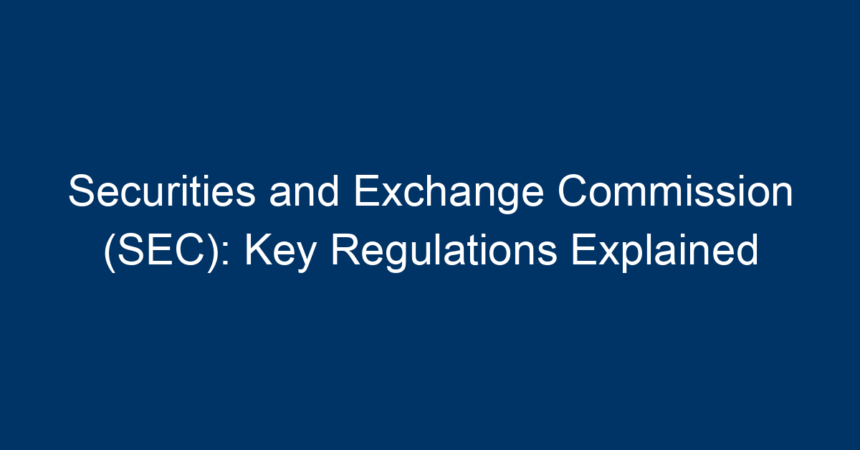The Securities and Exchange Commission (SEC) is a pivotal entity in the financial world, acting as a guardian of fair, orderly, and efficient markets. Its mission extends far beyond basic regulation; it plays a crucial role in protecting investors, maintaining market integrity, and facilitating capital formation. In this article, we will delve into the key regulations overseen by the SEC, providing clarity on their significance and the impact they have on both investors and financial institutions.
Understanding the Role of the SEC
Established in 1934, the Securities and Exchange Commission (SEC) was created in response to the stock market crash of 1929 and the Great Depression. The agency’s primary goal is to foster investor confidence through transparency and accountability in the securities markets. The SEC oversees the securities industry, enforces federal securities laws, and regulates the stock exchanges, investment companies, and other market participants.
Major Functions of the SEC
-
Investor Protection: The SEC ensures that investors receive essential information about securities before investing, thus promoting informed decision-making.
-
Fair Markets: It enforces rules against market manipulation, insider trading, and other fraudulent activities to maintain market integrity.
- Facilitation of Capital Formation: By ensuring a transparent and fair environment, the SEC enables companies to raise capital effectively, fostering economic growth.
Key Regulations Enforced by the SEC
Understanding the intricate web of regulations enforced by the SEC is crucial for both investors and companies. Here are some of the most significant ones:
1. Securities Act of 1933
The Securities Act of 1933 is one of the cornerstone laws that govern the securities industry. Its primary aim is to ensure that investors receive comprehensive information about securities being offered to the public. Key stipulations include:
-
Registration Requirement: Companies must register their securities with the SEC before offering them for sale to the public.
- Disclosure of Material Information: This involves providing detailed information on the company’s financial condition, management, and risks associated with the investment.
Failure to comply can result in severe penalties, including restitution of losses to investors.
2. Securities Exchange Act of 1934
The Securities Exchange Act of 1934 established the SEC and gave it authority over the secondary trading of securities. It focuses on regulating the exchanges and requires continuous disclosure of pertinent information from public companies. Key features include:
-
Reporting Requirements: Public companies must file periodic reports, including Form 10-K, Form 10-Q, and Form 8-K, detailing their financial performance and significant events.
- Regulation Fair Disclosure (FD): This regulation aims to curb selective disclosure by ensuring that all investors receive the same information simultaneously.
3. Investment Company Act of 1940
The Investment Company Act of 1940 regulates the organization and activities of investment companies. This regulation ensures that investors are protected from excessive fees and conflicts of interest arising from mutual funds and other investment entities. Critical components include:
-
Registration and Reporting: Investment companies are required to register with the SEC and provide regular reports to the SEC and shareholders.
- Advertising Standards: The act sets forth rules for how investment companies can advertise their products, aiming for transparency and truthfulness.
4. Investment Advisers Act of 1940
This act regulates investment advisers and requires them to register with the SEC or state regulators. It emphasizes fiduciary responsibility, ensuring that advisers act in the best interest of their clients. Highlights include:
-
Fiduciary Duty: Investment advisers must place their clients’ interests above their own and disclose any conflicts of interest.
- Ongoing Disclosure: Advisers must provide comprehensive information about their services, fees, and potential risks to clients.
5. Sarbanes-Oxley Act of 2002
The Sarbanes-Oxley Act (SOX) was enacted to enhance corporate governance and accountability following major financial scandals. Key components of SOX include:
-
Enhanced Financial Disclosures: Companies must adopt strict guidelines for financial reporting, ensuring that their financial statements are accurate and reliable.
- Whistleblower Protections: It provides protection for employees who report fraudulent activities or violations of laws, helping to foster an ethical corporate environment.
6. Dodd-Frank Wall Street Reform and Consumer Protection Act
Passed in response to the 2008 financial crisis, the Dodd-Frank Act aimed to reduce risks in the financial system through stronger regulation of banks and financial institutions. Important facets include:
-
Volcker Rule: Prohibits banks from participating in proprietary trading and limits their investment in hedge funds and private equity funds.
- Consumer Financial Protection Bureau (CFPB): Established to oversee financial products and services, ensuring that consumers are well-informed and protected.
The Impact of SEC Regulations
The regulations enforced by the Securities and Exchange Commission (SEC) are more than mere rules; they shape the very foundation of how businesses operate and how investors engage in the market.
For Investors
-
Confidence in Markets: With transparency and strict regulations, investors can make informed decisions, knowing they are protected from fraud.
- Access to Information: Regulatory requirements ensure that vital information is available, allowing investors to assess risks and rewards effectively.
For Companies
-
Building Trust: Companies that adhere to SEC regulations build credibility and trust among investors, leading to a higher likelihood of success.
- Access to Capital: By complying with regulations, companies can raise funds more efficiently, contributing to their growth and innovation.
Conclusion: Navigating SEC Regulations
Understanding the regulations enforced by the Securities and Exchange Commission (SEC) is essential for anyone involved in investing or managing funds. By being familiar with these laws, investors can make informed choices, while companies can operate effectively within a regulated framework.
Actionable Insights
-
Stay Informed: Regularly review SEC updates and guidelines to ensure compliance and stay ahead of market trends.
-
Seek Professional Advice: Consult with financial advisers or legal experts to navigate the complexities of SEC regulations effectively.
- Invest Responsibly: Always conduct thorough research before investing, using the information provided by companies under SEC regulations to inform your decisions.
By embracing the principles laid out by the Securities and Exchange Commission (SEC) and understanding its key regulations, you can enhance your investment strategy and contribute to a more robust financial market.




